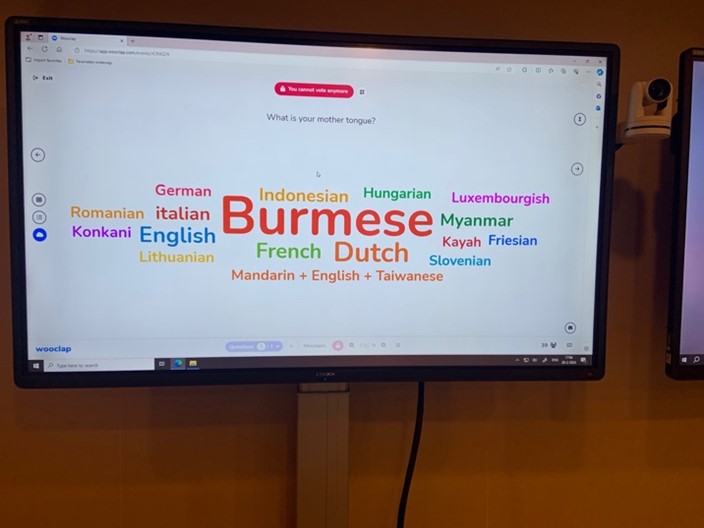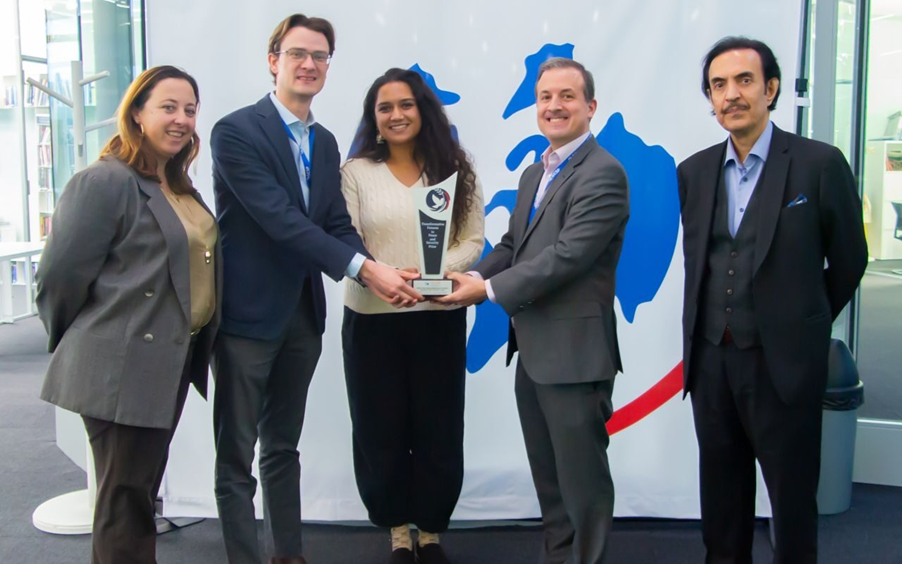Leiden University College The Hague
LUC's international activities
At Leiden University College (LUC), engagement with international societal partners occurs through research, education, and internships, fostering mutually beneficial collaborations with NGOs, public service institutions, and international counterparts.
Staff research projects are frequently embedded within larger national and international consortia, fostering mutual goal-setting and the development of equitable partnerships. Research findings are regularly shared with societal stakeholders, including NGOs and public service institutions.
LUC staff also have a strong record of involvement in Virtual International Collaboration (VIS) projects, enabling LUC students to work with their international counterparts on societal issues of shared interest and significance.
Explore the initiatives on this page for a glimpse of the international projects we're involved in.
Providing expertise and software to address sustainability and resilience challenges

LUC’s DESIRE (Decision Engineering for Sustainability and REsilience) laboratory offers expertise and software to tackle pressing challenges in collaboration with organisations such as The Netherlands Red Cross data and digital inititative, Biosphere Solar, CE Delft, Noria, and the United Nations (UN) Life Cycle Initiative.
For the Red Cross, the DESIRE Lab utilised staff and student capstone research to apply Multiple Criteria Decision Analysis (MCDA) to Nature-Based Solutions (NBS). These solutions leverage nature to address risks such as flooding, drought, and climate-related conflicts.
‘By leveraging the expertise of Leiden University College through the joint supervision of BSc students, the Red Cross was able to incorporate a comprehensive, data-driven approach in their feasibility study for flood risk management in Zambia. It allowed for the evaluation of various nature-based solutions, ensuring that environmental, social, and economic factors were all considered in addressing flood risks. The approach can also be scalable to other contexts where the Red Cross is implementing or will implement NbS’.
— Marc van den Homberg, Scientific lead 510, Netherlands Red Cross data and digital initiative
For CE Delft, the lab applied MCDA to support the development of heat transition action plans for neighbourhoods across the Netherlands. In partnership with Noria, students used Geographic Information System (GIS) models to identify plastic hotspots.
'By collaborating with Marco Cinelli of Leiden University College we can substantiate clear and supported choices in complex decision-making processes involving municipalities, residents, and businesses for the heat transition. LUC's DESIRE Lab has tools that are scientifically grounded, which we can apply in practice. This provides us with a solid foundation in our research and consultancy projects, and gives our clients a sense of a robust approach.'
— Benno Schepers, CE Delft | Manager Duurzame Stad
Most recently, the DESIRE Lab contributed to the launch of the UN’s Global Guidance for Life Cycle Impact Assessment Indicators and Methods (GLAM). This guidance provides practitioners, such as consultants and researchers, with tools to calculate comprehensive environmental impact scores for products and processes.
Contact
Transcending boundaries through virtual learning with storytelling and children's books
In partnership with the Virtual Federal University of Myanmar, LUC students engage in collaborative and co-creative learning with Burmese students who have fled the military junta. This Virtual International Collaboration module is integrated into two regular courses: Social Determinants of Health and The One Health Approach.
Students work together to produce socially relevant outputs, such as stories addressing opium production, primary education, gambling, and forests; a children's book exploring ancient connections to the land; and an educational leaflet highlighting the environmental consequences of weapons.
Real-time virtual teaching is facilitated through LUC’s hybrid classroom setup, enabling meaningful cross-border collaboration.
Read more
Contact
Improving the International Architecture of Global Governance
The Global Governance Innovation Network (GGIN) is a collaboration between LUC and the Stimson Center, an NGO dedicated to strengthening the international architecture of global governance, particularly in light of the UN’s upcoming Summit of the Future. Through the Global Policy Advisory Lab (GPAL), students conducted research, contributed sections to the Global Governance Innovation Report 2024, and published a blog post under their own names.
Co-publishing data on maternal and infant health in South Africa

Lay mental health counsellors working for an infant mental health NGO in Alexandra Township, South Africa, routinely document their home visits to vulnerable mothers. In collaboration with LUC and the Ububele Educational and Psychotherapy Trust, these organisational reports are treated as data, drawing on ‘what’s already there’ so as to avoid additional data collection among a population that is both over-researched and vulnerable (young infants).
Students work alongside the counsellors to analyse these reports, either through research clinics or as part of their capstone projects. Web posts and publications aim to bridge the knowledge gap in infant mental health in the Global South. A crucial output of this project is shared authorship, acknowledging and valuing different forms of expertise.
'We had a number collaborations with universities that did not feel very empowering, we felt we were merely source of data, it has felt extractive. Our partership with Leiden University College, felt like embodied true collaboration and participation and provided the first opportunity for non-academic partners to be recognized as co-knowledge producers, in formal ways, through publications, co-publications, co-authorship.'
— Nicki Dawson, Parent-Infant Programme Manager, Ububele Educational and Psychotherapy Trust










